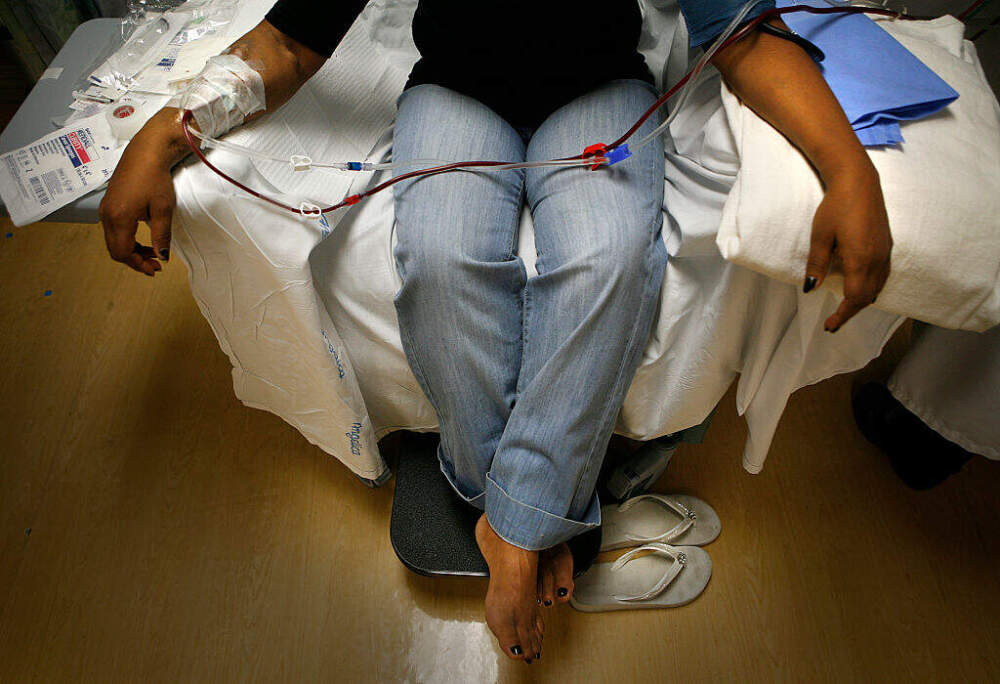Advertisement
Commentary
Mass.’s health insurance for undocumented immigrants provides a model other states can follow

In Tennessee, an undocumented man in his 50s sat in the overflowing waiting room of the Vanderbilt emergency department. As the hours passed, patients with trauma and chest pain rolled past him on stretchers to receive care. The treatment this man needed — dialysis — is as life-saving as emergency surgery, but is as inappropriate for the emergency room as a stubbed toe. But because Tennessee doesn’t offer the insurance coverage needed to access an outpatient dialysis center to undocumented immigrants, the emergency department is the only place he can get the treatment.
I cared for this gentleman as a Vanderbilt University medical student working at Shade Tree Clinic, a student-run clinic that helps uninsured and undocumented Tennessee residents obtain primary care at no cost. But after years of poor access to preventative care due to his undocumented status, the blood pressure and diabetes management we offered him came too late for his kidneys, and Tennessee provided no alternative to thrice weekly emergency room visits for dialysis.
In Massachusetts, where I’m now a primary care resident doctor, it’s a very different story. An undocumented man in his 20s reports to a health clinic for free services. I hear he came from Colombia with a limited supply of insulin and was rationing it because he had no prescriber in the United States. But he’s enrolled in MassHealth Limited, insurance for undocumented people paid for by state taxes under Massachusetts Medicaid (MassHealth), and becomes my patient. Because he’s insured, he can receive diabetes care and a prescription for insulin, preventing unnecessary and costly emergency room visits, hospital stays and possibly even time in the intensive care unit. Here I can use state resources to keep patients like him out of the emergency department.

Unfortunately, most states are like Tennessee. They provide limited options for undocumented people to access lower-cost preventative health care in clinics, which leads to higher-cost reactionary health care in emergency departments and hospitals. Ultimately, the cost of this hospital care is covered by taxes — just as state-run insurance for undocumented patients would be. The irony is that the cost of emergency care is even bigger. But Massachusetts serves as a model for other states, showing how tax dollars can be used more effectively to provide routine care for undocumented people and help them avoid more costly emergency room visits.
There are a few barriers to collecting data on potential cost savings: people understandably try to keep their undocumented status a secret and direct cost comparisons between states are confounded by the burden of chronic disease, density of outpatient healthcare providers and other regional measures. However, there is a lot we know for sure.
First, one-third of undocumented people nationally are forced to forgo regular health care. Advanced chronic disease due to lack of preventative care has an enormous economic burden — on the scale of $4 trillion, which includes both treatment costs and lost economic productivity. Second, hospital-based care is more expensive than care in the clinic and lack of insurance strongly correlates with emergency department visits, many of which are preventable. Eliminating preventable emergency visits has the potential to save $4.4 billion annually.
Health insurance for undocumented immigrants falls to the states because the majority of these people are not eligible for insurance through federal Medicaid (which covers low-income families including children and pregnant women, as well as people who receive Supplemental Security Income) or Medicare (which covers people age 65 and older or younger people with certain medical conditions, such as Lou Gehrig’s disease). A minority of states, including Massachusetts, provide insurance options for undocumented immigrants through state-funded Medicaid. But according to a Kaiser Family Foundation report, this still leaves 50% of undocumented adults uninsured, compared to about 5% of U.S.-born American citizens. And that explains why 40% of undocumented adults say the emergency room is their only option for health care.
Advertisement
Expanding health insurance for the undocumented is, of course, expensive, but it’s important to note that undocumented immigrants do, in fact, pay taxes. More than $12 billion in federal and state taxes are paid by undocumented immigrants from Mexico alone, including taxes filed through individual tax identification numbers (an alternative to social security numbers), payroll deductions and sales tax. This data reflects that 96.7% of Mexican immigrants are employed (they make up more than 11% of the agricultural workforce in the U.S.). It is also important to recognize that tax dollars are already being spent on healthcare for undocumented people — we’re just doing it less efficiently than we could.
The losses hospitals incur from the enormous unpaid bills that result from hospitalizations and emergency room visits by low-income Medicaid or uninsured patients, including both American citizens and undocumented immigrants, are partially offset by Medicare and Medicaid payments to hospitals that see a high proportion of these patients. About 65% of the $38 billion dollars in uncompensated care was subsidized by federal dollars in 2016. A program called Emergency Medicaid reimburses hospitals for emergency care of undocumented immigrants, but the criteria for what is considered an emergency varies from state to state, leaving a lot of hospitals uncompensated for care. In short, we are hemorrhaging tax dollars into emergency treatment for problems, such as my Tennessee patient’s end-stage renal disease, that could be prevented or addressed by routine care that takes place in clinics.
As the number of undocumented immigrants in the U.S. grows to more than 11 million and with hospitals already frequently above capacity, we need to be strategic about re-distributing health care from hospitals to clinics. It may seem counterintuitive, but providing insurance options for undocumented people would save money and improve the patient experience for everyone by diverting care for undocumented immigrants out of emergency rooms.
States that did not expand Medicaid, and therefore still have a rather sizable uninsured population, including American citizens, offer an important lesson. The sickest of these patients can typically still qualify for Medicare or Medicaid through some other criteria. For example, citizens in any state who have end-stage renal disease and need dialysis or with certain disabilities can qualify for Medicare. At the very least, state Medicaid could do the same for undocumented people who meet similar criteria. The legislature in Utah, for example, recently created “alternative eligibility requirements” to insure undocumented children under state Medicaid.
Moves like this remind us that health care access and cost are bipartisan issues. Providing undocumented immigrants with health insurance ultimately benefits us all by reducing costs and creating capacity for true medical emergencies. Currently, there is no clear path to federal Medicaid expansion to include coverage for undocumented immigrants. Therefore, it will continue to be up to states to choose preventative care over reactionary care by expanding insurance to cover undocumented immigrants.
As a doctor who has worked in a state that chose to expand coverage and one that didn’t, the right choice is clear to me. I hope more and more states will follow the Bay State’s lead.
